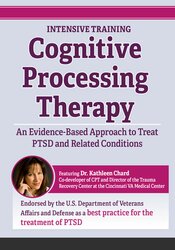Additional Participant CE: Due to the nature of this program, we are not able to offer additional participant CE for this program. Each person wishing to participate will need to purchase the webinar.
Webinar Registration Capacity: There is a registration capacity of 250 registrants.
Free Book/Shipping: Included in your registration is your own copy of Cognitive Processing Therapy for PTSD. Select the free add-on book before checkout to receive a copy.
You can get FREE SHIPPING for the book by adding promo code "CPTSHIP" on the Shipping Info screen at checkout in the "Discount Code" box on the right side of the screen. Free shipping only applies to domestic orders.

Endorsed by the U.S. Departments of Veterans Affairs and Defense, the International Society of Traumatic Stress Studies, and the U.K. National Institute for Health and Care Excellence (NICE) as a best practice for the treatment of PTSD, Cognitive Processing Therapy (CPT) is an evidence-based approach to treating trauma that helps clients:
Presented by CPT co-developer Dr. Kathleen Chard, this 2-day intensive training will encompass every step of this highly structured, 12-session cognitive treatment approach from start to finish, complete with opportunities to practice, ask questions, and receive constructive feedback from both your peers and Dr. Chard herself.
Designed to prepare you to use CPT right away, this training will equip you with session-by-session instructions, scripts, worksheets, and handouts to help move your clients from suffering and despair to hope and healing. You’ll learn:
Don’t miss this opportunity to train with one of the leading trauma experts in the field – sign up today!
The CPT Manual is FREE with Registration ($52 value!)
Included in your registration is your own copy of Cognitive Processing Therapy for PTSD. It will be shipped to you after checkout. When you click "Add to Cart" be sure to select "Add Bundle to the Cart" to ensure the book is included with your registration.
You can get FREE SHIPPING for the book by adding promo code "CPTSHIP" on the Shipping Info screen at checkout in the "Discount Code" box on the right side of the screen.
**Please note: You will NOT have access to an archived version of this webinar after the program has ended.**
Planning Committee Disclosure - No relevant relationships
All members of the PESI, Inc. planning committee have provided disclosures of financial relationships with ineligible organizations and any relevant non-financial relationships prior to planning content for this activity. None of the committee members had relevant financial relationships with ineligible companies or other potentially biasing relationships to disclose to learners. For speaker disclosures, please see the faculty biography.
Continuing education credit information is coming soon for this live webcast.
| File type | File name | Number of pages | |
|---|---|---|---|
| Manual - 2-Day Intensive Training Cognitive Processing Therapy - 2024 (6.8 MB) | 62 Pages | Available after Purchase |

Kathleen M. Chard, Ph.D., is a co-developer of CPT and director of the Trauma Recovery Center at the Cincinnati VA Medical Center. Serving as the VA CPT Implementation Director, Dr. Chard oversees the dissemination of CPT to mental health clinicians across the United States. She is the co-author of Cognitive Processing Therapy for PTSD: A Comprehensive Model (The Guilford Press, 2017) and author of CPT for Sexual Abuse treatment manual (2012). A sought-after speaker, Dr. Chard has personally trained over 5,000 clinicians throughout the United States on using CPT with veterans, active-duty personnel, and civilians in addition to overseeing the training of tens of thousands of others via the trainers she supervises. She is co-chair of a 17-site study comparing CPT to Prolonged Exposure in US veterans in addition to conducting a $6 million-dollar Department of Defense study on the assessment of PTSD. She served as a past editor of the Journal of Traumatic Stress and is a professor of Clinical Psychiatry and Behavioral Neuroscience at the University of Cincinnati.
Speaker Disclosures:
For live CE credit, you must watch the live webcast in its entirety at its scheduled time and complete the CE quiz and evaluation within one week.
Please Note: You will NOT have access to an archived copy of the webcast after the program has ended.
Please note: Each day there will be a 70-minute lunch and two 15-minute breaks; one in the morning and one in the afternoon. Lunch and break times will be announced by the speaker and at their discretion. A more detailed schedule is available upon request.
Visit our FAQ page at www.pesi.com/faq or contact us at www.pesi.com/info
| 5 |
|
| 4 |
|
| 3 |
|
| 2 |
|
| 1 |
|
Satisfaction Guarantee
Your satisfaction is our goal and our guarantee. Concerns should be addressed to: PO Box 1000, Eau Claire, WI 54702-1000 or call 1-800-844-8260.
ADA Needs
We would be happy to accommodate your ADA needs; please call our Customer Service Department for more information at 1-800-844-8260.
PESI Mobile App
Access CE trainings on your phone or tablet through our free mobile app. Choose video or audio-only versions of online courses from the world’s best instructors, and complete your CE requirements anywhere, anytime, at your own pace.
Please wait ...